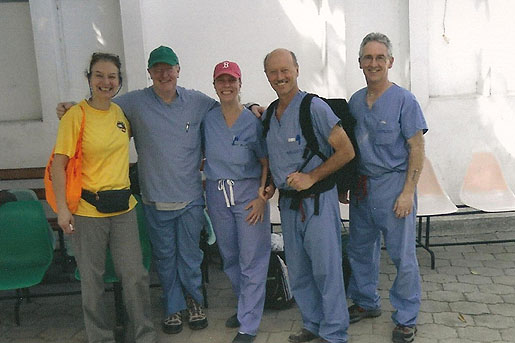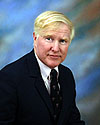USGA Committeeman Burke Helps In Haiti Relief Effort
Doctor from Massachussetts part of group that recently went to earthquake-stricken Caribbean nation
 |
Dr. Paul Burke (second from left) was part of a group of Massachusetts medical personnel that recently went to Haiti to assist in the relief effort from the devastating Jan. 12 earthquake. (Courtesy of Dr. Paul Burke) |
March 1, 2010
By David Shefter, USGA
As a longtime golf volunteer, Dr. Paul Burke has given back plenty to the game. He is the current vice president of the Massachusetts Golf Association, and he has served the USGA since 2006, first on the Public Links Championship Committee and now the Regional Affairs Committee.
But when a devastating earthquake struck the impoverished Caribbean country of Haiti on Jan. 12, the level of Burke’s benevolence would make conducting a championship or giving an on-course ruling feel mundane and insignificant.
Two weeks after Haiti was rocked by the 7.0 temblor, the 56-year-old vascular surgeon from Andover, Mass., was contacted by
 |
Dr. Paul Burke |
Partners In Health, an organization affiliated with Massachusetts General Hospital, about forming a team of surgeons to assist with medical relief. Burke quickly assembled a diverse group that included nurses, anesthesiologists and orthopedic surgeons to travel to Haiti. Burke even procured a private jet from a major medical company, and food and medical supplies to supplement the relief effort.
“We actually had a selection process,” said Burke, who is in line to become president of the MGA in 2011. “We wanted people who could wear more than one hat and people who could live in the environment we were going in… A lot of people don’t have the ego to do that.”
For Burke, it was like going back to medical school. He was about to perform operations he hadn’t done in more than 20 years.
However, the trip was delayed several weeks when Burke’s team was notified that the clinics that his unit was assigned to were full. Desperate to help, Burke contacted the American College of Surgeons, who put him in touch with another group of medical personnel already working in Haiti.
With two days to pull everything together, Burke arranged for medical supplies to be donated from Saints Medical Center in Lowell and Lowell General Hospital. More donations came from other sources.
The team eventually flew to the Dominican Republic, and then to Jacmel, Haiti, where they were greeted by soldiers from the Canadian army.
“I didn’t serve in Vietnam, but that’s what it felt like,” said Burke about their arrival in Haiti. “There was rubble everywhere. The smell was pretty bad from the decomposing bodies. There was no excavation effort whatsoever.
“Honestly, I don’t think [the country] will ever recover. We were treating people to get them over the hump. It was the second-poorest nation in the world before [the earthquake].”
For 10 days, Burke’s team worked nonstop within a tented community alongside a team of Cuban relief workers. They operated without the benefit of X-ray machines, lab results or even an EKG (electrocardiogram) unit. Burke treated one woman with chest pains by having her walk until she felt pain.
Through the use of a satellite phone, a head and neck specialist back in Boston assisted as Burke conducted surgery on a badly broken neck.
“I was doing everything,” said Burke. “Initially they wanted me down there because vascular surgeons can do amputations. It turns out I was the only surgeon around so I had to do everything, which I hadn’t done in a long time.
“During the day I was folding surgical scrubs and gowns and washing them between cases.”
Burke, who wrote several blogs on his experience, doesn’t know how many operations he performed. From television reports, he was prepared for the devastation and his medical background certainly helped him cope with the severity of the injuries. But his heart wasn’t ready for the plethora of tragic stories.
One young amputee – Burke estimates she was 2 – had lost her entire family in the rubble. “She was just the cutest thing,” he said. “She would play peek-a-boo with us. They wouldn’t even put her up for adoption because she doesn’t have a leg.”
Another amputee, a 10-year-old boy, told Burke, “I was no good before this, how am I going to function now?”
Along the street, Burke saw a homeless person pushing a shopping cart. “If you are homeless in Haiti, it doesn’t get much worse than that,” said Burke.
One man had been buried in the rubble for such a long time that his arm was crushed and basically useless from lack of circulation. To prevent anyone seeing his injury, he had taken a cardboard box and taped it around the arm for a month. When he wandered into the medical tent, Burke immediately amputated the limb.
“He was lucky that [the infection] didn’t spread,” said Burke.
Burke was continually amazed at the level of charitable contributions from the U.S. and around the world. One man estimated that he had spent $80,000 in airline fuel flying people from the Dominican Republic to Haiti. Among the supplies being flown in, Burke even found a golf head cover “just sitting there among the supplies. How it got there, I have no idea.”
When Burke’s 10-day stay ended on Feb. 15, it was a surreal experience landing back in the U.S., where medical care and state-of-the-art facilities are taken for granted.
“It was an amazing thing,” said Burke of the trip. “I never thought it would be this difficult. If we went down in different circumstances, it wouldn’t have had the [emotional] impact that it does now. It was life-changing for everyone on our team.”
David Shefter is a USGA communications staff writer. E-mail him with questions or comments at dshefter@usga.org. To read all of Dr. Burke's blogs, click here. The USGA recently made a donation to Partners In Health to assist in the relief effort. To make a donation, click here.
